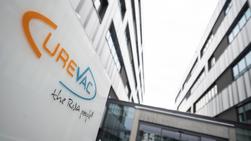 This file photo dated Jan 7, 2021 shows the CureVac company headquarters in Tuebingen, Germany. (SEBASTIAN GOLLNOW / DPA VIA AP, FILE)
This file photo dated Jan 7, 2021 shows the CureVac company headquarters in Tuebingen, Germany. (SEBASTIAN GOLLNOW / DPA VIA AP, FILE)
GENEVA / ROME / LONDON / COPENHAGEN / LJUBLJANA / SANTIAGO / ADUNATII-COPACENI, Romania / BERLIN / BRASILIA - CureVac NV is abandoning its first-generation COVID-19 vaccine to focus on another shot it’s developing together with GlaxoSmithKline Plc.
European regulatory authorities had indicated the vaccine probably wouldn’t be approved before the second quarter of next year, the Tuebingen, Germany-based biotech said on Tuesday. By then, CureVac and Glaxo expect to be conducting late-stage patient trials of a second-generation shot, the company said. The company’s advanced purchase agreement with the European Commission will be a cancelled as a result.
CureVac’s first-generation COVID-19 vaccine delivered disappointing trial results earlier this year. The shot was 48 percent effective at preventing disease of any severity - well behind the more than 90 percent rates shown by messenger RNA shots from Pfizer Inc-BioNTech SE and Moderna Inc.
Like those shots, CureVac’s also relies on mRNA, a technology that essentially enlists the body’s own cells to produce vaccine material. The shot is slightly different from that of competitors, however, because it uses an unmodified form of mRNA.
The Glaxo project uses a more refined version of the CureVac technology, with lab test results that the company has said indicate a higher level of efficacy. The partners plan to start recruiting patients for a trial of that shot by the end of this year, with potential approval in 2022.
Moderna
Moderna on Tuesday said the US Food and Drug Administration should authorize booster doses of its COVID-19 vaccine in fully vaccinated older adults and high-risk individuals.
The company said its data supports the public health benefit of a booster dose of its vaccine to restore immune response, while reducing the number of "breakthrough" infections in fully-vaccinated adults.
Moderna's comments were released in briefing documents ahead of a Thursday and Friday meeting of the FDA's outside expert advisers to discuss booster doses of Moderna and Johnson & Johnson's COVID-19 vaccines.
Rival Johnson & Johnson on Tuesday also cited data showing increased protection after a booster dose, which it said could be either administered as early as two months after the original dose of its vaccine.
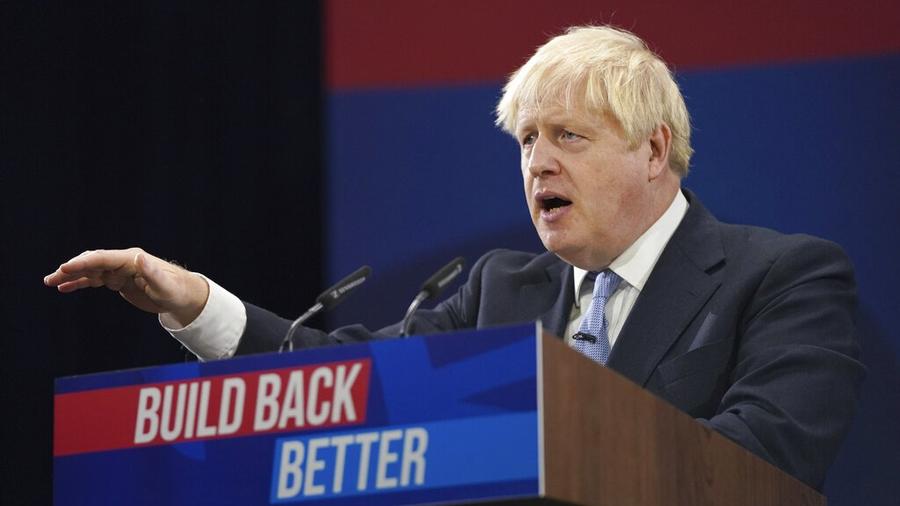
Britain's Prime Minister Boris Johnson gestures as he makes his keynote speech at the Conservative party conference in Manchester, England, Oct 6, 2021. (JON SUPER / AP)
UK
Boris Johnson’s UK government made serious mistakes in its early handling of the coronavirus pandemic and should have imposed a full lockdown more quickly, a move that would have saved many lives, a parliamentary inquiry found.
In a sharply critical joint report released Tuesday, the health and social care committee and science and technology committee said the UK had adopted a “fatalistic approach” to COVID-19 in early 2020, failing to learn from East Asian countries that halted the spread of the virus using swift lockdowns and mass testing.
Instead, the UK effectively accepted “that herd immunity by infection was the inevitable outcome,” the committee said.
That decision meant the virus was allowed to spread through the population before lockdown eventually began on March 23, 2020, according to the report.
The government denies that herd immunity has ever been part of its pandemic strategy.
But the MPs said: “It is now clear that this was the wrong policy, and that it led to a higher initial death toll than would have resulted from a more emphatic early policy.”
The findings add to pressure on Prime Minister Johnson over his pandemic decision-making, ahead of a major public inquiry due to start next spring.
A spokesman said the government was at all times “guided by scientific and medical experts and we never shied away from taking quick and decisive action” during the pandemic.
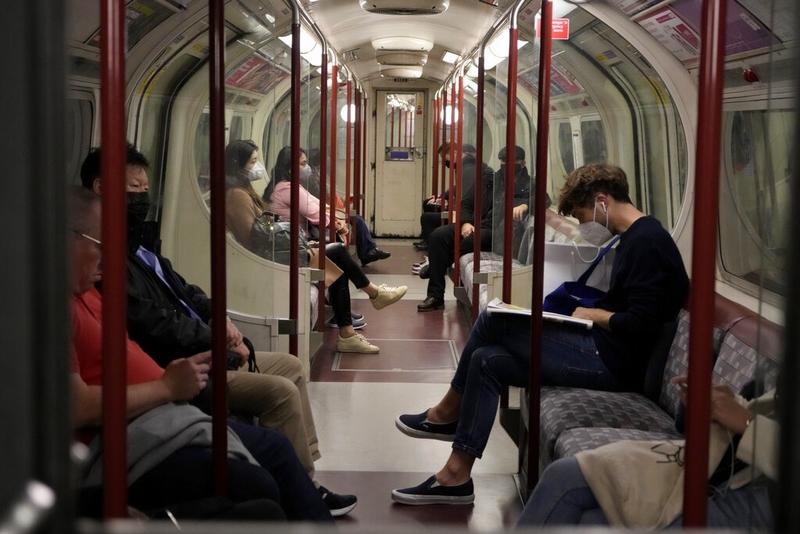 People traveling in a tube underground train carriage wear face masks to curb the spread of coronavirus on the Bakerloo Line in London on Oct 4, 2021. (MATT DUNHAM / AP)
People traveling in a tube underground train carriage wear face masks to curb the spread of coronavirus on the Bakerloo Line in London on Oct 4, 2021. (MATT DUNHAM / AP)
Labour’s shadow health secretary Jonathan Ashworth called the publication a “damning report” documenting “monumental errors.”
The UK’s COVID-19 death toll in 2020 was “significantly worse” than many countries, in particular in comparison to Asian nations closer to where the virus first appeared, according to the report. To date the UK has recorded 137,000 fatalities, the most in Western Europe.
The committees concluded that it was a “serious mistake” to halt widespread testing in March 2020 - a decision attributed to to a lack of capacity.
As a result contacts could not be traced and accurately monitoring the spread of the virus across the country became impossible.
“The UK was reduced to understanding the spread of COVID-19 by waiting for people to be so sick that they needed to be admitted to hospital,” the report found. Large-scale testing only resumed in mid-May 2020.
The test, trace and isolate system -- with a budget of 37 billion pounds ($50.4 billion) - was “slow, uncertain and often chaotic” throughout the first year of the pandemic, the committee found, and this “severely hampered” the UK response.
It “ultimately failed” in its objective to prevent future lockdowns despite its “vast” budget, the report concluded.
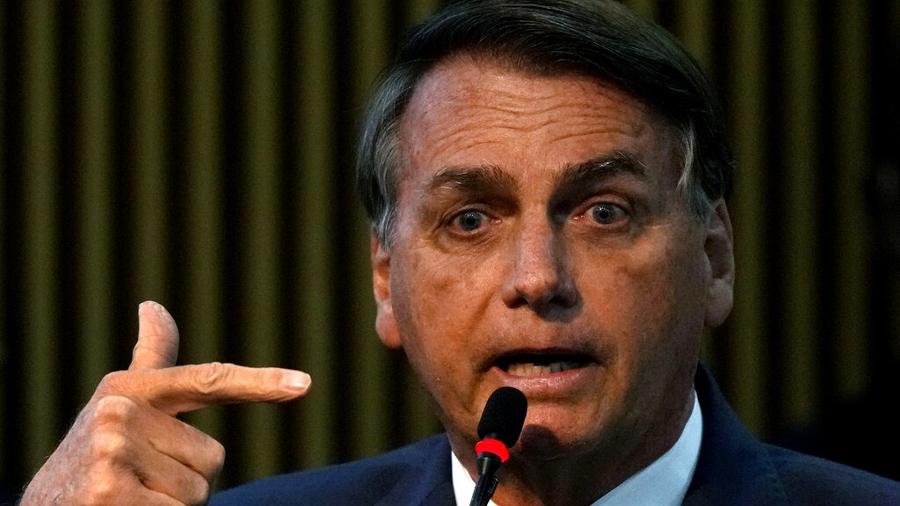 Brazil's President Jair Bolsonaro speaks during a ceremony at the Ministry of Citizenship, in Brasilia, Brazil, Aug 2, 2021. (ERALDO PERES / AP)
Brazil's President Jair Bolsonaro speaks during a ceremony at the Ministry of Citizenship, in Brasilia, Brazil, Aug 2, 2021. (ERALDO PERES / AP)
Brazil
Brazil's President Jair Bolsonaro said on Monday that he did not want to be "bored" with questions about the milestone of 600,000 COVID-19 deaths that Latin America's biggest country passed a few days ago.
Bolsonaro's poll numbers have fallen due to his handling of the pandemic, rising inflation and a weak economy. Brazil has the world's second highest COVID-19 death toll after the United States, and Bolsonaro has long sought to minimize the impact of the virus, touting unproven cures and railing against lockdowns.
On Monday, Bolsonaro was surrounded by supporters at the beach in Guaruja, in Sao Paulo state, when a journalist asked him about the country's death toll.
"In which country did people not die? Tell me!" he responded. "Look, I didn't come here to be bored."
Currently, 601,011 people have died from COVID-19 in Brazil, with over 21.5 million cases total.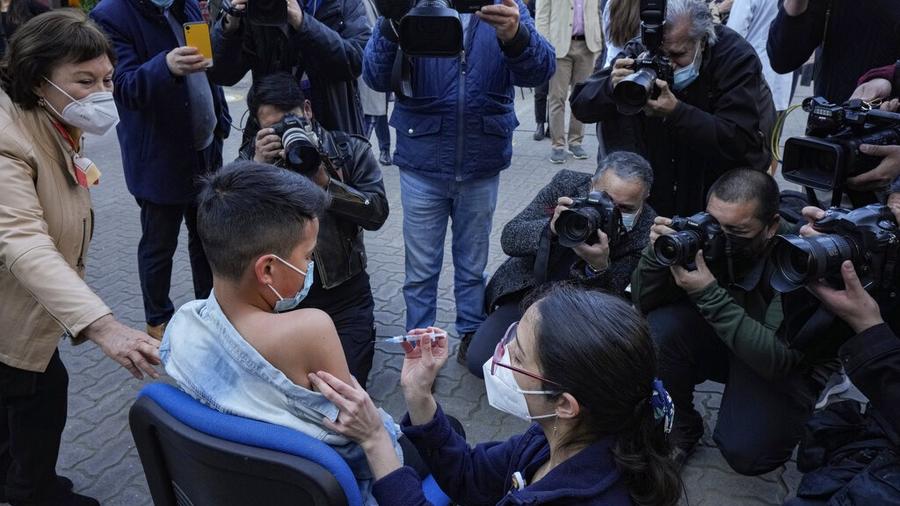 A healthcare worker inoculates a child with a dose of the Coronavac COVID-19 vaccine at the Providencia school in Santiago, Chile on Sept 27, 2021, during the start of vaccinations in schools for children between ages 6 to 11. (ESTEBAN FELIX / AP)
A healthcare worker inoculates a child with a dose of the Coronavac COVID-19 vaccine at the Providencia school in Santiago, Chile on Sept 27, 2021, during the start of vaccinations in schools for children between ages 6 to 11. (ESTEBAN FELIX / AP)
Chile
Chile on Monday registered less than 1,000 new daily cases of COVID-19 in the previous 24 hours, after three days of over 1,000 cases a day.
According to the Health Ministry, tests detected 996 cases, raising the accumulated total to 1,663,383 since the onset of the pandemic in the South American country.
In the same 24 hours, seven more people died of the disease, pushing the pandemic death toll to 37,571.
Denmark
A new inhalation treatment for COVID-19 patients has won approval for a clinical trial involving humans, Rigshospitalet (Copenhagen University Hospital), one of largest hospitals in Denmark, said in a press release on Monday.
Developed by Danish researchers, the treatment is based on the idea of Thomas Bjarnsholt, professor at the Department of Clinical Microbiology at Rigshospitalet.
"It is a treatment where you inhale a mild acid solution, which gives the immune system a hand in fighting infections in the respiratory tract from bacteria or viruses," said Bjarnsholt in the press release.
Initially targeted at patients admitted with COVID-19, there is also hope that it could also become "a game-changer in the treatment of other types of respiratory infections."
The patent for the technology used in the treatment is held by the Norwegian company SoftOx Solutions, which collaborated in the research after participating as providers of a stable acid solution to treat wounds in a previous study.
"The idea for the treatment comes from our previous research into the ability of acid solutions to fight infections in wounds. It is the same idea which has now been refined and converted into inhalation treatment for fighting infections in the airways," Bjarnsholt said.
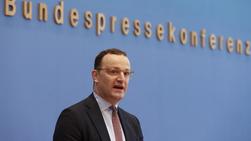 German Health Minister Jens Spahn addresses a press conference on the situation of flu vaccines and the coronavirus pandemic in Germany, in Berlin on Oct 6, 2021. (ODD ANDERSEN / AFP / POOL)
German Health Minister Jens Spahn addresses a press conference on the situation of flu vaccines and the coronavirus pandemic in Germany, in Berlin on Oct 6, 2021. (ODD ANDERSEN / AFP / POOL)
Germany
As vaccinations are generally freely available to citizens in Germany, free COVID-19 testing will no longer be offered as of Monday.
Individuals who cannot be vaccinated and for whom there is no general recommendation for vaccination continue to receive free rapid antigen testing, according to the government. Free COVID-19 testing, for example, will still be available for children under 12.
Minister of Health Jens Spahn defended the move.
"Fairness to the taxpayer makes it necessary to abolish free test for citizens," he told the Funke Mediengruppe on Sunday.
The Robert Koch Institute for disease control and prevention (RKI) registered on Monday 3,111 positive COVID-19 tests within 24 hours. The incidence rate of new infections per 100,000 people climbed to a two-week high at 66.5.
To date, almost 54.27 million people in Germany have been fully vaccinated against COVID-19, bringing the country's vaccination rate to 65.3 percent, according to the RKI.
Global tally
Coronavirus cases worldwide surpassed 238.25 million while the global death toll topped 4.85 million, according to data compiled by Johns Hopkins University.
 In this file photo dated Sept 13, 2021, a teacher (left) has her COVID-19 green pass checked by a school worker as she arrives at the "Isacco Newton" high school, in Rome. (ANDREW MEDICHINI / FILE / AP)
In this file photo dated Sept 13, 2021, a teacher (left) has her COVID-19 green pass checked by a school worker as she arrives at the "Isacco Newton" high school, in Rome. (ANDREW MEDICHINI / FILE / AP)
Italy
Italy's attempt to boost vaccinations by making a contested health pass necessary to go to work is not having the desired effect, data shows.
Prime Minister Mario Draghi's government decreed last month that from Oct 15 any worker who fails to present the so-called "Green Pass" will be suspended without pay, hoping to convince "no-vax" Italians to have the jab.
Public Administration Minister Renato Brunetta said when the measure was announced on Sept 16 that it would trigger such an "enormous" acceleration of vaccinations that its goal could be largely achieved before it actually came into force.
This "announcement effect" has not materialized.
In the week to Oct 8, some 410,000 people received a first shot, data from the COVID-commisioner's office showed, a fall of 36 percent from the week before and the lowest weekly tally since early July.
The government's announcement initially seemed to trigger a modest acceleration in jabs, which rose by 11 percent in the first week after Sept 16 while remaining well below the rate of two weeks earlier.
There was a further pick-up of 15 percent in the seven days from Sept 24 to Oct 1, before the steep decline of the last week.
The Green Pass, which certifies the holder has either been vaccinated, recently recovered from infection or tested negative in the previous 48 hours, was originally conceived to ease travel around Europe.
ALSO READ: DRC reports Ebola resurgence in addition to COVID-19
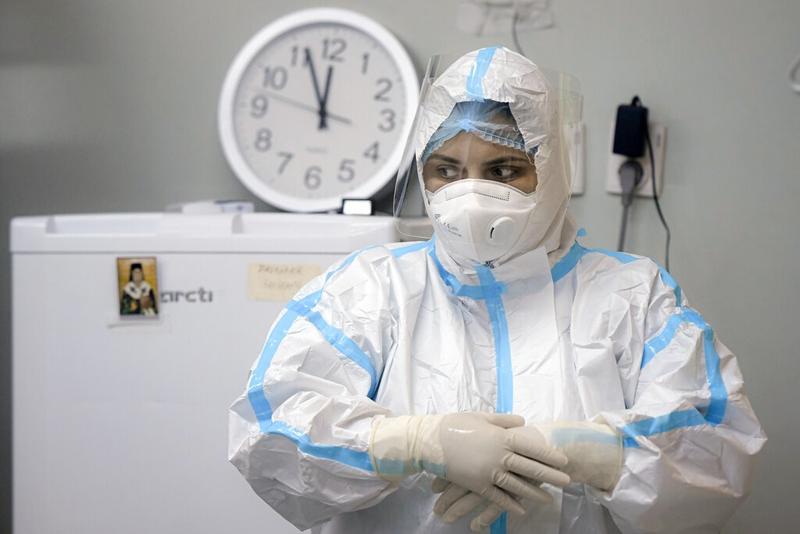 A member of the medical staff adjusts her gloves at the COVID-19 ICU unit of the Marius Nasta National Pneumology Institute in Bucharest, Romania on Sept 23, 2021. (ANDREEA ALEXANDRU / AP)
A member of the medical staff adjusts her gloves at the COVID-19 ICU unit of the Marius Nasta National Pneumology Institute in Bucharest, Romania on Sept 23, 2021. (ANDREEA ALEXANDRU / AP)
Romania
In leafy Romanian villages surrounding the capital Bucharest, few people realize one person has died from COVID-19 every six minutes in the country during the first 10 days of October, and vaccine scepticism remains high.
These villages have some of the highest COVID-19 infection numbers and lowest vaccination rates in the country, which is being ravaged by the fourth wave of the pandemic, with ambulances queuing outside hospitals filled to the brim.
Daily transmission numbers are rising across Central and Eastern European states, and Romania is experiencing record case and death rates as it grapples with the European Union's second-lowest vaccination rate.
Official data showed more than 70 percent of confirmed infections were in unvaccinated people, as well as 93 percent of deaths.
Roughly one in seven people in Adunatii-Copaceni, 20km south of Bucharest, have had a COVID-19 vaccine, less than half the national average, and on Sunday, 15 people out of a thousand were infected.
Russia
Russian President Vladimir Putin said on Tuesday that Russia needed to speed up its vaccination campaign against COVID-19 as the country recorded 973 coronavirus-related deaths on Tuesday, its highest single-day death toll since the start of the pandemic.
Russia was fast to develop and launch its Sputnik vaccine when the pandemic struck last year, but take-up has been slow, with many Russians citing distrust of the authorities and fear of new medical products.
The nation recorded 28,190 new infections in the space of 24 hours, the government coronavirus task force said.
Slovenia
Slovenia decided on Monday to recommend the priority use of mRNA (messenger ribonucleic acid) vaccines against COVID-19, such as those produced by Pfizer/BioNTech and Moderna, the Ministry of Health said in a statement on Monday.
The ministry follows recommendations of the government's advisory group of experts, according to which vector vaccines (those produced by AstraZeneca and Johnson & Johnson) should only be used if a person requests it specifically or if a person has contraindications to mRNA vaccines.
Slovenia has so far administered AstraZeneca's vector vaccine. The use of Johnson & Johnson's vaccine (Janssen) was temporarily suspended on Sept 29 after a 20-year-old woman died days after receiving the Janssen shot. The investigation into the exact cause of her death is ongoing.
Slovenia will also recommend that persons below the age of 30 should be vaccinated with Pfizer's Comirnaty mRNA vaccine, citing data that shows that Moderna's vaccine poses a "somewhat higher risk" of heart inflammation, the ministry said.
The ministry also recommends the use of a third (booster) vaccine dose in all people over the age of 65, and to also make it available to everyone above the age of 18.
ALSO READ: 20% of serious England virus cases are pregnant, unvaccinated
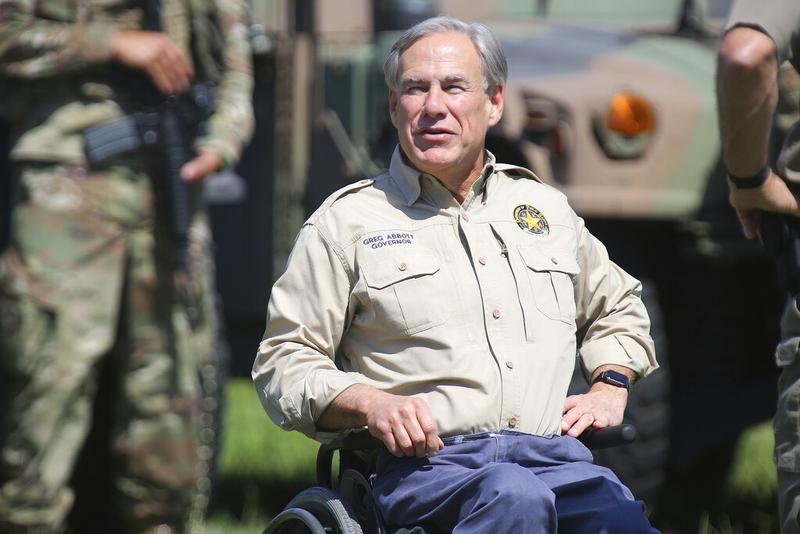 Texas Governor Greg Abbott, joined by 10 other governors, arrives at a press conference at Anzalduas Park on Oct 6, 2021 in Mission, Texas. (JOEL MARTINEZ / THE MONITOR VIA AP)
Texas Governor Greg Abbott, joined by 10 other governors, arrives at a press conference at Anzalduas Park on Oct 6, 2021 in Mission, Texas. (JOEL MARTINEZ / THE MONITOR VIA AP)
United States
Republican Texas Governor Greg Abbott, responding to what he called "bullying" by the Biden Administration, on Monday barred all COVID-19 vaccine mandates in the state by any entity, including private employers.
Abbott's move sets him up for a clash with President Joe Biden, a Democrat who last month called on businesses nationwide to order their workers to be vaccinated or lose their jobs. At least several thousand people have since been fired for refusing to comply.
"In another instance of federal overreach, the Biden Administration is now bullying many private entities into imposing COVID-19 vaccine mandates, causing workforce disruptions that threaten Texas' continued recovery from the COVID-19 disaster," Abbott said in an executive order.
Abbott's order states that "no entity in Texas" could compel proof of vaccination by any individual, including employees or customers. He called on state lawmakers to take up the issue in an upcoming special session.
Biden issued his mandate in September as his administration struggled to control the pandemic, which has killed more than 700,000 Americans.
Political leaders across the United States have ratcheted up pressure on the unvaccinated in recent weeks.
Laws requiring proof of vaccinations are deeply controversial in the United States, with many Americans criticizing them as unconstitutional and authoritarian.
Proponents of vaccine mandates see them as necessary to pull the nation out of the nearly two-year pandemic and return to normalcy.
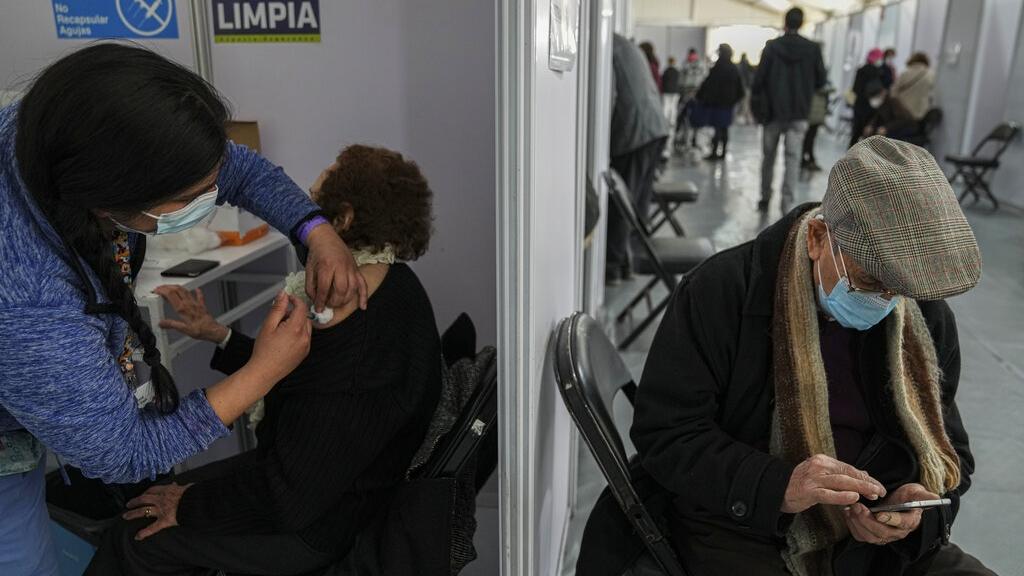 A senior gets a third shot of the AstraZeneca COVID-19 vaccine during a campaign to give booster shots to the elderly over the age of 86, at the Bicentenario stadium in Santiago, Chile, Aug 11, 2021. (ESTEBAN FELIX / AP)
A senior gets a third shot of the AstraZeneca COVID-19 vaccine during a campaign to give booster shots to the elderly over the age of 86, at the Bicentenario stadium in Santiago, Chile, Aug 11, 2021. (ESTEBAN FELIX / AP)
WHO
The World Health Organization on Monday recommended that immunocompromised people be given an additional dose of COVID-19 vaccine, due to their higher risk of breakthrough infections after standard immunization.
The Strategic Advisory Group of Experts on immunization said the additional dose should be offered "as part of an extended primary series since these individuals are less likely to respond adequately to vaccination following a standard primary vaccine series and are at high risk of severe COVID-19 disease".
WHO vaccine director Kate O'Brien, referring to people with lower immunity due to other conditions, told a news briefing: "The recommendation is for a third vaccination, an additional vaccination in the primary series and again that is based on the evidence showing that the immunogenicity and evidence on breakthrough infections is highly disproportionately represented by those people."
The panel also recommended that people over 60 receive an additional dose of the shots made by Chinese vaccine makers Sinopharm and Sinovac some one to three months after completing their schedule, citing evidence in studies in Latin America that they perform less well over time.
Health authorities using the Sinopharm and Sinovac vaccines should aim first to maximize two-dose coverage in the older populations and then administer the third dose, the panel said.
The SAGE group, composed of independent experts who make policy but not regulatory recommendations, will review all global data on booster shots in a Nov 11 meeting, amid questions over variants and potential waning of immunity, O'Brien said.
Currently some 3.5 billion doses of COVID-19 vaccines have been administered, O'Brien said.
An estimated 1.5 billion doses are available globally each month, enough to meet the target of vaccinating 40 percent of each country's population by year-end, but distribution is unequal, she added.
"Giving those booster doses to individuals who have already had the benefit of a primary response is like putting two life jackets on somebody and leaving others without any lifejacket," O'Brien said.
"In this sense we are talking about getting the first lifejacket onto people who have immunocompromising conditions."


